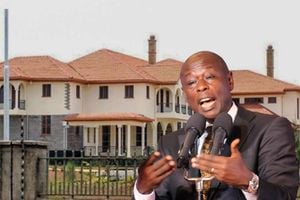
From left: Former Director-General of Vision 2030 Mugo Kibati, former Kenya Power MD Joseph Njoroge and former Energy PS Patrick Nyoike.
A parliamentary committee has asked the anti-graft agency to probe former Energy permanent secretaries Patrick Nyoike and Joseph Njoroge for approving skewed power purchasing agreements (PPAs) with Lake Turkana Wind Power (LTWP).
The National Assembly Energy committee, in its report on the probe into high cost of power tabled before the House, also wants former Director-General of Vision 2030 Mugo Kibati probed by the Ethics and Anti-Corruption (EACC).
In the report, the committee wants Mr Nyoike probed for his involvement in fast-tracking the approval process of the PPA between Kenya Power and LTWP.
The committee chaired by Mwala MP Vincent Musyoka says Mr Nyoike ignored a letter by the National Treasury dated May 22, 2009 raising concerns about the cost effectiveness of the project.
The committee says Mr Nyoike, who served as PS between 2003 and 2012, approved the PPA despite Treasury saying the project requires further thought before implementation.
'No proper legal risk assessment'
As the Managing Director of Kenya Power, the report says, Mr Njoroge was implicated in the approval of the PPA before the company had obtained a licence to generate electricity. The PPA was also executed without a proper legal risk assessment
“He was part of the Kenya Power and Lighting Company (KPLC) Board that ignored concerns raised by the World Bank ... key among them being the take or pay obligation...that exposed Kenya Power and Lighting Company to the unacceptable high financial risk of payment of curtailed energy,” reads the committee report.
Mr Njoroge served as the MD of Kenya Power from 2007 to 2014 and as the PS in the Energy ministry from 2015 to 2021
As for Mr Kibati, the report says he influenced national development priorities and could have impacted the projects’ public and governmental support. The committee adds that Mr Kibati’s transition to LTWP as chairman in 2014 also raises questions about impartiality, given his prior endorsement of the project in a joint press briefing with Carlo van Wageningen, the then chairman of firm despite concerns by the World Bank.
“The timing of Lake Turkana Wind Power’s incorporation as a Vision 2030 project and Mr Kibati’s subsequent role as chairman has led to the need for further investigation into whether his influence may also have played a role in the fast-tracked project approval and execution processes” reads the report.
Mr Mugo Kibati served as Director-General of Kenya Vision 2030 between 2009 and 2013 and has been chairman of LTWP from 2014 to date.
The committee wants EACC to probe the three and report to the House within six months upon adoption of the report.
LTWP completed the power plant in Loiyangalani, Marsabit County in 2017, but the line to evacuate power was not completed until September 2018.
The PPA provided that Kenya Power constructs a new substation near Loiyangalani to interconnect to the national grid.
In an audit by Auditor-General Nancy Gathungu in 2021, it was found that LTWP invited tenders on behalf of Kenya Power for the works, which was deemed a conflict of interest. The auditor also accused Kenya Power and the Energy ministry of failing to conduct an independent legal risk assessment prior to the execution of the “capital project of such a magnitude”.
The committee noted in its report that the cost of power in the country is one of the highest in Africa and this accounts for the high cost of production that acts as a disincentive to investment, affecting Kenya’s investment competitiveness.
Most of the independent power producers (IPPs), including those locally owned, are paid in foreign currencies such as the euro and dollar, exposing Kenyans to the risk of exchange rate fluctuation.
The committee also regretted that some of the lines that are supposed to evacuate power remain incomplete, including the Sondu-Homa Bay-Ndhiwa line, which is key in stabilising power in Western Kenya.
The Narok-Bomet line, whose completion would reduce dependency of Western Kenya on the Muhoroni gas turbines, and the Rabai-Kilifi line and the Mariakani sub-station, which would help evacuate power from Olkaria to the Coast region and reduce dependence on the thermal power generators, are all still pending.
Also yet to be completed are the Turkwel-Ortum-Kitale line which will help to evacuate cheap hydro power from Turkwel and the Ethiopia-Kenya interconnector to allow import of cheaper power from Ethiopia.
In April last year, the National Assembly passed a motion by Laikipia Woman Representative Jane Kagiri that effectively kicked off the process of investigations into high electricity costs.
The motion also locked the Energy ministry and Kenya Power from getting into any new contracts with IPPs until MPs complete the inquiry into the high power costs.









